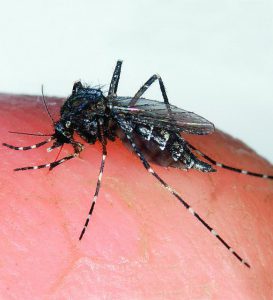 It is an often made wish of summer that the cold weather of winter will kill all the mosquitoes, gnats and no-see-ums. This climactic fete would spare people, pets and livestock the irritation of encountering these low flying pest and their predatory behavior.
It is an often made wish of summer that the cold weather of winter will kill all the mosquitoes, gnats and no-see-ums. This climactic fete would spare people, pets and livestock the irritation of encountering these low flying pest and their predatory behavior.
Unfortunately, the thermometer would have to drop to levels approaching the surface temperature of the planet Neptune to eliminate these winged annoyances.
There are individual steps which will help minimize the potential for exposure to exotic diseases.
Check surroundings for standing water, especially in secluded spots or small quantities. The home landscape and patio garden can produce hundreds, if not thousands, of hungry mosquitos during the summer if standing water is left for long.
Trays and dishes under flower pots commonly collect water which is usually left to evaporate or be absorbed by the plant over time. To mama mosquito this shallow and protected source is an ideal location to deposit eggs for the next generation of voracious airborne insects.
Plants with natural depressions or “cups” can accumulate enough irrigation and rain water to establish an effective mosquito nursery. Even though it may evaporate, these tiny pools will last long enough to hatch many mosquito larvae into potential disease vectors.
Back porch bromeliads can easily deliver this undesirable outcome. So too can mature live oak trees which commonly have hollow spaces between large branches.
Even a wheelbarrow left to the elements can serve as a portable pond to maternity minded mosquitos. Dumping the water on a frequent basis is the easiest method, but there are also larvae-cides which are effective in difficult to dump reservoirs.
Protective clothing when outdoors is useful to reduce exposed skin which mosquitos view as an excellent dining site. Heavier fabrics and loose-fitting designs provide the best protection while maintaining maximum comfort for the wearer.
Minimizing exposure at dusk and dawn, when native mosquitos are most active, will reduce the probability of serving as an unsuspecting blood meal for a swarm or lone hunter. Unfortunately, some of the exotic mosquitos are prowling 24 hours a day and are pleased to attack at any opportunity.
As the weather warms, be ready for mosquito season. This past winter only whetted their appetite.
 0
0
